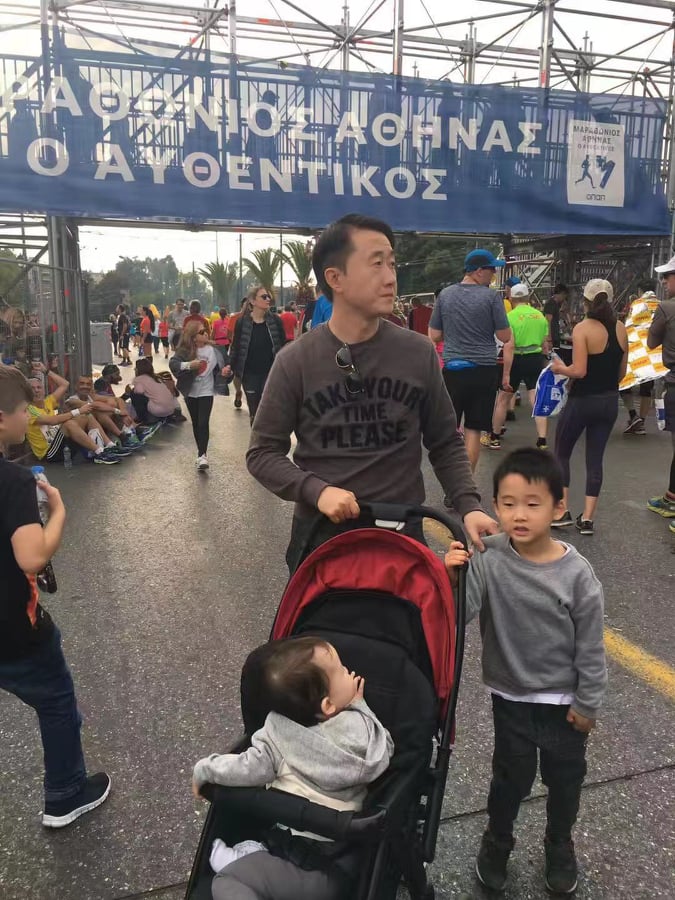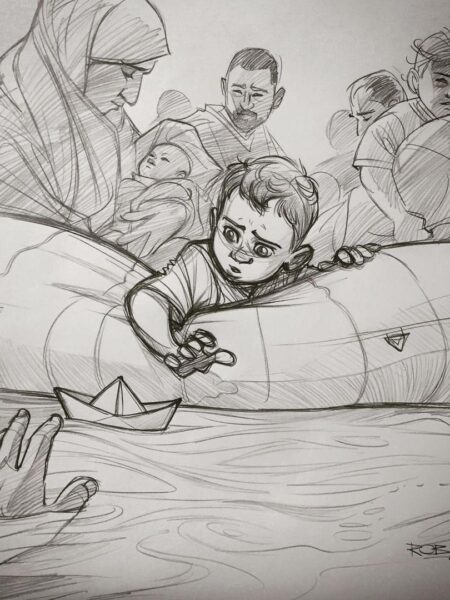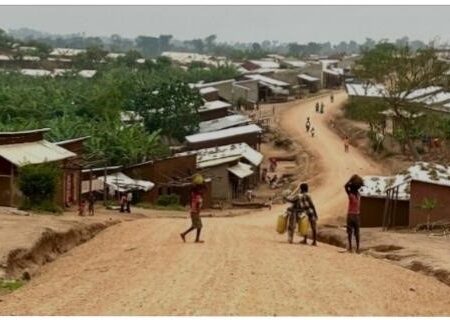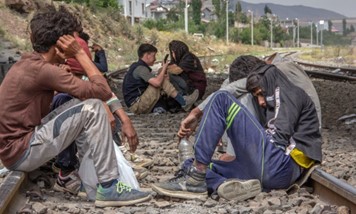I. Chinese Immigration
Greece is without a doubt the country which accede to many immigrants everyday because it’s the entrance point to Europe from Asian countries. In this paper I studied the immigration of a Chinese person to Greece. Before starting this project whenever I heard about immigration, stories always came to my mind about people who lived in poverty, with no money, food and housing because of a war or because of bad financial conditions. But it didn’t happen the same way with Mr. Wang. For the first time I realized that people can be immigrants even if they live gracefully in their home country. The present case involves a person who had everything in his home country. He had for example his family, he had his needs covered, and he has a very good education status (he studied in university and also knows English pretty well). In this paper I am referring to “immigration”, because the term means that a person leaves his country and comes to another one in order to stay permanently. In addition, by using this term, I emphasize the point of view of destination. That’s why I used immigration and not other terms like emigration or migration. In my case Mr. Wang immigrate from his country (China) and he settled permanently to a new country (Greece). In this project I mainly focused on his experience and his life in Greece. Me and Mr. Wang maybe had the same thoughts about what immigration is supposed to be, because when I used this word, he refused to identify himself as an immigrant. In his mind immigration is the outcome of poverty, or bad financial and living conditions. For that reason he doesn’t accept the term immigration to describe his moving to Greece. He thinks on the other hand that he travelled to Greece in order to be independent from his family, he wanted to live alone and try to survive to a new country. Immigration is for sure a product of globalization. The case of Mr. Wang is not an exception. He immigrated from one continent (Asia) to another (Europe) in order to be independent and try to live within a different cultural context. In this process Mr. Wang was adapted really well in the Greek society and in the Greek way of life. Also because of his profession of teaching Chinese, he taught many Greek students the Chinese language. The immigration of Mr. Wang and this exchange of Greek and Chinese culture are included to Global History. This paper is about life history because I am really interested in the experience of immigration. In the conversation with Mr. Wang I was really interested to learn the motives and the reasons which made him to abandon his home and venture to the unknown.
Approximately 20000 Chinese live currently in Greece, who came mainly from Wenzhou and Zhejiang since the 1990s. A significant number lives in downtown Athens, Greece’s capital city. The two main reasons for which Chinese immigrants select Greece is the specific macroeconomic characteristics of Southern European countries and its geographical position. Southern European countries in general do not require high price living conditions. So it’s much easier for Chinese immigrants to survive at these countries which are cheaper.
Until 2006-2007 the Chinese community in Greece comprised mostly of immigrants with lower education level, who came from provinces like Fujian, Zhejiang, Shanghai and Guandong. They spoke the Mandarin Chinese dialect and worked mainly in the trade sector. After 2006 Chinese people with high education also started coming to Greece Chinese people. At that period also Chinese companies became famous in Greece, while the Chinese language gained in popularity. The installation of various Chinese companies in Greece offered Chinese people many opportunities to other professional sectors. Mr. Wang’s immigration experience to Greece is a good example.
II. Introduction of Mr. Wang
Mr. Wang is a Chinese teacher who immigrated from China to Greece. Mr. Wang lived in Jiujiang, a city in the center of China, between Beijing and Shanghai, the two commercial Chinese cities. He finished his studies at the age of 22 and he decided to live his city and his family. He told me that this decision was not an outcome of not having a job in China. It was because he wanted to be independent. He didn’t want to live with his parents or receiving financial aid from them. From the start of our conversation, I started to realise that Mr. Wang was not an immigrant who was forced to leave his country because of lack of money. He was a person who wanted to explore a different continent and try new things away from his home. When I asked him about his moving to Greece, he doesn’t characterize it as “immigration”. He argued that he was not an immigrant. He described his immigration more like a relocation for working purposes. He could call himself more like a cultural contributor of Chinese culture to Greece. So it’s really impressive that Mr. Wang did not describe himself as an immigrant.
III. Mr. Wang’s plan
In the beginning Greece was not on the map for him. His plan was to go to Belgium and start a master course building on his major which were economics and business. Greece was not a choice for him back in 2004. He confided to me that no Chinese person knew Greece before 2004 Olympics. Greek economic boom that accompanied the Olympics made Greece an important turning point for Chinese businesses. Many Chinese opened outlets and warehouses. Also they showed up many import and export companies as well as general service industries. The economic crisis of 2010 had serious implications in Greek economy and also at Chinese small businesses. The crisis hit Euro and RMB. 15 years ago 1 euro had the value of 11 RMB but form 2010 till today 1 euro has the value of 7.8 RMB. So it’s clear that the proportion between euro and RMB is less valuable. This lead many Chinese small business to close. Only big companies corporations survived in Greece like Huawei and Cosco. Mr. Wang back in 2004 didn’t know anything about Greece, until a friend of his professor in the university told him that he would move to Greece to work for the Chinese embassy. His friend convinced him to travel and work in Greece. He doesn’t think that this was an easy decision. It was a risky choice. We can imagine how risky and difficult is to give up your studies and go to another country to follow a really different career path. Finally, he didn’t manage to travel to Belgium because of Visa problems. At this point, it’s important to refer to the value of being member of a group when it comes to immigration. Mr. Wang was not supposed to study in Belgium alone. He was a part of a group of people from the same university who wanted to pursue the same master course at Belgium. So when things didn’t go as planned, Mr. Wang and his group listened to the friend of their professor and emigrated to Greece. Therefore we can understand the importance of human networks and social capital in immigration. Mr. Wang took a risk in order to change his career and moved to another country, but he had already a network of people around him. He probably feared that if he went in Belgium alone, he wouldn’t have the connections in order to get help. This was the main reason that he chose Greece in the end. It wasn’t a free decision. It was mainly a decision based on the existence of a network of friends, colleagues and compatriots.Immigration is not an untroubled process. It’s a demanding process because people have to leave their family and friends behind and follow a career in the unknown. Mr. Wang told me that it was not an easy choice to leave his family but it was the only way in order to be independent. For him, family is a really important issue and this relationship between parents and children is irreplaceable. But he had to grow up and be responsible for his own decisions. So being the only child in the family (he had only cousins) wanted to create something on his own. Also, Mr. Wang expressed me something really special. In my question about why didn’t he move somewhere else in China to seek his independence, Mr. Wang told me that a different continent would give him a different culture and a different way of thinking. That’s why he wanted to leave China after all.
IV. Change of plans and final destination Greece
However, Mr. Wang came to Greece in 2005 with one goal in his mind, to become a teacher. He gave up his dream of business studies and relied on the words of his professor friend, that Greece had in store a bright future for him in practicing and teaching the Chinese Language. His friend played a decisive role in order to facilitate his adaptation in Greek society and also to find a job easily. He started immediately to teach private lessons and also at Confucius Institute. At the beginning there were not many children who were willing to learn Chinese. His family played an important part in order to survive in Greece. During his first years he didn’t have enough money to cover his needs, so his family was sending him money from China. A paradox is that despite the fact that Mr. Wang immigrated to be independent, in his first years in Greece he wasn’t so independent after all. Wiring money is a fundamental process in immigration, and Mr. Wang’s case is not different. Nevertheless, when private schools started to include Chinese language in their curricula, Chinese language became famous. That’s why some years later he was asked to work for Moraitis school, one of the most prestigious private education institutes in Athens. Mr. Wang told me that despite his goal to study business, teaching was also in his plans. He loves his country and his culture, so he wants to impart his knowledge to people. Teaching makes him feel alive, and especially teaching his language in a different country, surely, broadens his horizons. When I asked him why he didn’t follow the initial plan of studying business this time in Greece, he answered that some things can’t go according to plan. Also he said that Chinese people in their way of thinking, believe that really often have to make crucial changes in their lives. Now, Mr Wand do some private lessons and work at a language institute. Covid situation made him to abandon Moraitis school because schools closed due to lockdown.
V. Difficulties in adaptation
We have to bear in mind that adaptation in a different country is not a simple task. So it was for Mr. Wang who told me that when he first came to Athens, he experienced a culture shock. Greece back in 2005 was much more underdeveloped than the rest of Western Europe or China. It took a while for him to get used to the slower rythms of everyday life. One of the things that made an impression on in the beginning it was the fact that Athens didn’t have tall buildings such as skyscrapers. He was really shocked because China is full of skyscrapers, overcrowded public places like public transport. He told me that Athens was like a “village”. Besides the cultural shock, Mr. Wang faced the problem of language. And it’s really inevitable because Chinese language has no relation with the Greek language. Although I have to mention that Mr. Wang is an experienced English speaker. Three things were the most challenging for Mr. Wang at hisfirst years in Greece. First of all, it was really difficult for him to negotiate in public services such as Social Security Institute, the Ministry of Foreign Affaires etc. Especially, dealings with the Ministry of Foreign Affaires were really important for his life in Greece, because he had to translate many certificates from Chinese to Greek. His friend helped him at the beginning with these affairs, but eventually he had to learn the language in order to communicate. Secondly, he couldn’t remember Greek names. He told me that after a while he started to realize that there were many Kostas, Maria, Katerina and also ancient names, that he had to pronounce accurately and remember. Thirdly he had to learn the everyday language in order to communicate and survive in Athens. He told me that in his lessons, he doesn’t speak Greek to his students because many of them know English and it is easier for him to impart the message in English rather than Greek. But in places such as the grocery store for example, he has to speak Greek because others maybe do not know English. When I asked him what did he do in order to learn Greek, his answer was really impressive. I was expecting that he would tell me he attended some classes, but Mr. Wang didn’t do it in that way. Rather, when he had a break from his lessons, he would hang out and chat with his Greek students. By this way his own students helped him to learn everyday Greek language. Also, he is very sociable and possess an outgoing personality, which helped him to make many Greek friends and learn from them. By that we can understand that his social skills helped him to survive in a very demanding environment where he had no clue about language and culture.
VI. Family
Mr. Wang was married 10 years ago and now he has two children. A son of 8.5 years old and a daughter of 4.5 years old. He met his wife in Athens, but she is Chinese too. Both of them they had a mutual Greek friend who was responsible for their meeting. He told me that marriage of foreign people in Greece was a tough process, because it requires a lot of bureaucracy. All the certificates had to be translated from Chinese to Greek. Also, they need now and then a renewal as well as their visa. The legal system of Greece can’t accept having two citizenships, so Mr. Wang and his wife decided to keep their Chinese citizenship. Mr. Wang told me that he feels more like Chinese than Greek and changing his citizenship would be a huge step for him but in the wrong direction. There are also practical reasons if he changed his citizenship, then he would be a foreigner whenever he wanted to visit China. And in China the legal system is really strict for foreigners. Hence, he did not want to lose the privileges that Chinese citizenship affords him because it’s where his parents live.
His two children are going to primary and nursery school. Both kids study in Greek schools and they learn the Greek language. In this way, Mr. Wang want to acculturate his kids in the Greek society. But at the same time his kids are studying Chinese language and culture at a Chinese school in order not to be cut off from their mother tongue. Thus, in the morning they are going to a local public Greek school, and in the afternoon they are going to Downtown Athens in order to study Chinese in a school only for Chinese kids. Mr. Wang tries to help his children to learn both languages. I asked him about his kids, what do they feel, Greek or Chinese? He told me that they can decide whatever they want when they grow up. At the moment they are Chinese but if in the future they want to apply and change their citizenship they are free to do it. Also he told me that he would never forbid his kids to leave their land and work abroad. On the contrary, he would encourage them to do it in order to think differently. Knowing little things about China, when I hear Chinese children the notorious one child policy always came up to my mind. Mr. Wang denied that the one child policy was the reason he left his country. First of all he immigrated at a really young age (22 years old) and the marriage was not at that moment in his mind. But he explained to me that the one child policy no longer exists in China. This changed five years ago and now people who belong to Han Nation can have up to two kids. But there is a significant difference. If someone does not belong to the Han Nation and belongs to other ethnic groups, he can have as many kids as he wands inside China’s territory. And that’s because Han people are by far the largest ethnic group.

VII. Customs and culture in the new country
Before my conversation with Mr. Wang I thought that coping with religious and cultural differences in general would be a really problematic aspect of his life in Greece. I thought that it would be challenging for a Chinese person to leave back a familiar cultural environment behind and get used to another way of life. But Mr. Wang assured me that for him something like that wasn’t a problem. He justified that by telling me that in China, the state let people to believe in whatever they want. His family is not strictly attached to religion (Buddhism in this particular case), so it was easy for him to have his eyes open and adjust easily to a different culture. Also he claimed that only previous generations are attached to Buddhism. Most of young people in China are going to temples only for tourist and visiting purpose. On the other hand, Mr. Wang tries to follow some Chinese customs and lead his children by example. For example, he always welcomed me in his home really warm-hearted. His family has adopted a diet that includes both Chinese and Greek cuisine. This illustrates the coexistence of both Greek and Chinese cultural elements under his roof and this made it easier for his children not to forget their roots.
Mr. Wang never forgets about his roots. Every summer, whenever he finds the chance, he visits his family in Jiujiang. He told me that returning back to his home country is not a simple and easy task. Life between China and Greece is not comparable, so it’s really difficult for him to move back and forth between distinct ways of life. It always feels good to come back home, but the life rhythm in Chinese towns are so fast comparing to Greece and every time he gets a cultural shock. Especially now with COVID-19, his trip to China was very exhausting. He had to stay isolated for 24 days in quarantine at a hotel in Beijing before he was allowed to travel to Jiujiang. A year ago, the pandemic impeded him to meet his parents.
VIII. First impressions about Greece and Greeks
When Mr. Wang arrived in Greece what it made him a good impression was for sure the friendly environment of Greek people. He told me that when he was lost in the street and asking about directions, Greek people were really helpful. Especially, one time a person told him to pick him up with his car. Most times he didn’t have any problem of discrimination or a bad behavior from the Greek society. Only one time in Syntagma Square someone offered him ouzo to drink and demanded 50euros. He was trying to cheat Mr. Wang because he assume that he was a tourist. But Mr. Wang didn’t drink and told him that he lives here and he knows how much an ouzo costs. What Mr. Wang learned about his experience is that there are good and bad people in every country. In Greece, the environment is friendly in general but that doesn’t mean that people don’t have to be careful.
All in all, Mr. Wang declares that his plans for the future is mainly the graduation of his children. He will wait them to finish school and then maybe he would help his parents in China. His parents are now too old to look after themselves. Mr. Wang gives a lot priority to his family. He feels thankful because without his father and mother he wouldn’t be able to travel and work abroad. His parents were a support by his side and they believed in him.
In conclusion we have to bear in mind that immigration in a global perspective is not an easy process. On the other hand, it requires various forms of capital in order to help people survive in their new home. First domain is social capital. The importance of social capital lies in the interpersonal networks between Chinese people. Especially, social capital involves social networks, such as family members, friends or relatives who immigrated before. It can help immigrants not only in their adaptation process but also it’s a reliable source of financial support. In Mr. Wang’s case, pivotal was the role of a friend of his professor, who told him about Greece and helped him with his adaptation. Also, it is included his parents who helped him financially in his first years in Greece. Second domain is political capital. It’s the policies of Chinese Governments which are responsible to make Chinese immigration safer and more reliable. Mr. Wang travelled to Greece legally and he wanted to be legalised in his stay in Greece. Third domain is human capital. With this term we refer to personal characteristics and the case of likelihood in international immigration. Especially we refer to sociodemographic characteristics which differ between Chinese cities and societies. A major factor in human capital is education level. Higher the education level, better economic returns to their family in China. From our conversation I understood that Mr. Wang was an immigrant with high education level and financial status. His immigration to Greece was not an outcome of poverty or bad living conditions. It was a choice based on his ambition to live in another country and discover different cultures. So having a high human capital status it was easier for Mr. Wang to adapt in Greek society.
Bibliography
- Kevin Latham, Bin Wu. “Chinese immigration into the EU: new trends, dynamics and implications”. Europe China Research and Advice Network, (2013).
- Maria Markoutsoglou Mantha Kassou Athanasios Moshovos Yiorgos Ptohos. “Asian Migrants in Greece: Origins, Status and Prospects”. Institute of International Economic Relations 7, 2007.
- Yao Lu, Zai Liang and Miao David. “Emigration from China in Comparative Perspective”. Social Forces 92, No. 2 (December 2013), pp. 631-658. Published by: Oxford University Press






